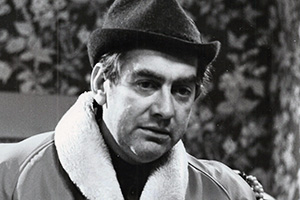Hancock and The Girl
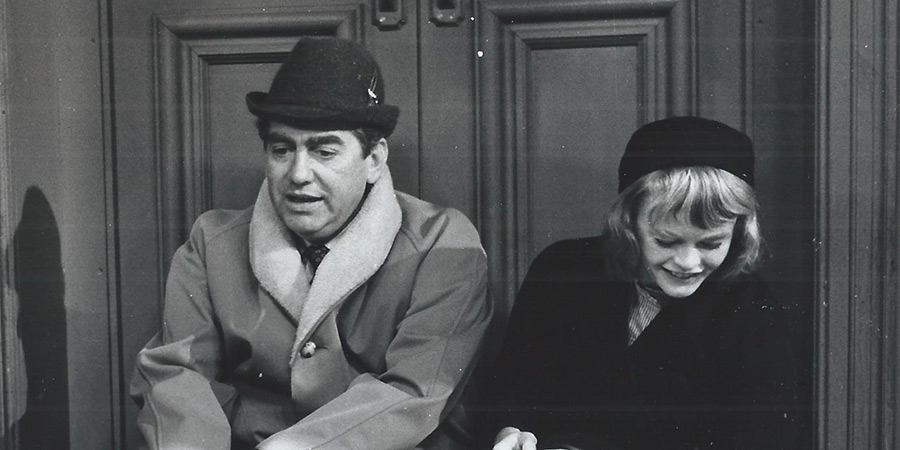
Shortly after Ray Galton and Alan Simpson had devised a script that saw Tony Hancock realise one of the most significant moments in British Comedy history (namely, The Blood Donor featuring the eternally quoted line: "A pint?! That's very nearly an armful!") they wrote a film script for him that they truly believed in.
The project was titled The Day Off and imagined Tony Hancock as a lowly bus driver. The film would have followed him throughout one day in his life, namely his day off. It was packed full of short vignettes where Tony caused a kerfuffle in a supermarket or an upset at the barbers, but it had a poignancy running through it, such as in a scene where Hancock goes to unwind at his favourite, yet inexplicably hostile, barbed-wire-enclosed park.
As the film was never made, we can't say who would have been cast as the man that Tony is chatting to in this scene, but at the same time, any Hancock fan will tell you with a fair amount of certainty that it would have been Hugh Lloyd.
TONY: Well, this is pleasant isn't it. Do you ever feel, you know sitting out here in the open spaces, do you ever feel insignificant?
MAN: How do you mean?
TONY: Well, I mean, for instance, you look up at the sky.
[He bends his head upwards and looks straight up into the sky]
TONY: Are you looking?
[The man is looking straight up as well]
MAN: Yes.
TONY: How high would you say that was?
MAN: Ohh, I don't know, It's a long way isn't it?
TONY: Long way? It doesn't end, it just goes on... and on... Can't you feel it?
MAN: What?
TONY: Small... insignificant... ants, that's all we are. Can't you feel it? You can't see anything around you, just the sky, going on, never ending, it makes you feel small, don't you feel small?
MAN: [Pause while he tries] No... no not really.
TONY: You must do. Concentrate. You see we're down here, and there's nothing up there but space, and more space, as far as you can see just space.
MAN: Oh yes.
TONY: See, you're feeling it now aren't you? Insignificant.
MAN: No, I can't say I am.
TONY: Well, you must be feeling something.
MAN: My neck's aching a bit.
TONY: Never mind about your neck. Concentrate. We're here, sitting on this bench and up there... actually it's better when you're lying on your back.
MAN: You can't lay on your back here, it's not allowed.
TONY: I know it's not. Let's forget about it.
[They stop looking up in the air]
TONY: You need to do it at night time... you get a better sense of... with the stars shinning... it makes you feel more... well insignificant.
MAN: Oh. [Pause] I'm sorry it didn't work. You're not upset, are you?
TONY: No, no. We can't all be built the same.
MAN: No that's true. I suppose you've got more imagination than I have.
TONY: It doesn't matter most people aren't very interested anyway. They can't grasp it you see, it's too vast, they don't like thinking they're insignificant.
MAN: How did you first come by it?
TONY: What?
MAN: Feeling insignificant.
TONY: Well..it..it just happened.
MAN: You didn't study it then?
TONY: No, no.
MAN: Oh, I thought you might be a philosopher.
TONY: Well...no, not exactly, I never really had the time. No, it just happened. Down at Margate it was... I'd just been in for a swim, and I flopped down on my stomach, and the sun was a bit hot on my back, so I turned over and there it was... nothing. Clear blue sky. Insignificant.
A mini facsimile of The Day Off script was included with The Rebel's Blu-ray release from Network and upon reading it's easy to see why. Any Hancock fan will tell you that these scenes start playing out in your head as soon as you read them. We're sure you felt it then, if you've any familiarity with Hancock's work. It's as though you've seen this film before.
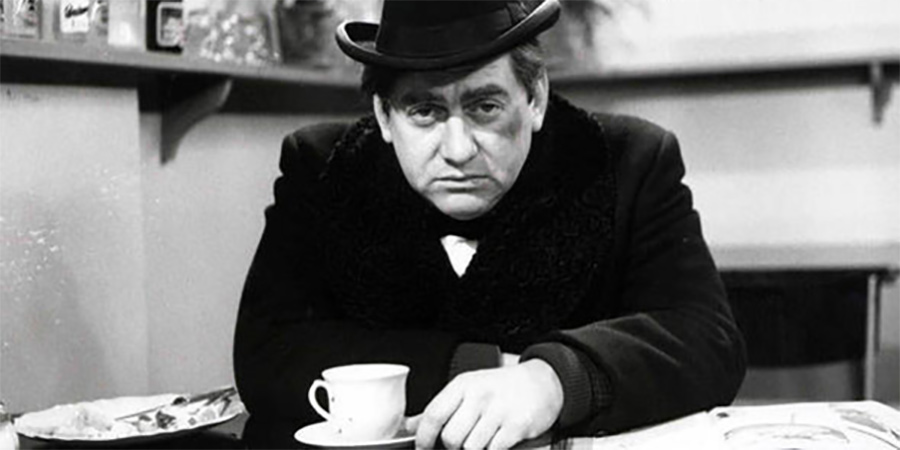
This iteration of Tony Hancock's comic persona is a man without purpose, on a quest to enjoy his little life and to find someone to feel insignificant with. Eventually he does find just the woman, she's called Charlotte, and, in an attempt to impress her, he lies about his job, pretending to be an architect. Little does he realise that Charlotte, who herself had taken a fancy to Hancock, is also lying about her occupation in order to impress him.
This wasn't your typical Hancock's Half Hour romance, where Tony (alongside the great Sidney James) became involved in acerbic exchanges with his dates, such as, 'I've had better nights!' to which Hancock fires back, 'Well, you've seen better days dear!' In this script there is a genuine play for a heartfelt romantic plotline with his character. One of the many facets of Tony's performance was a childlike view of the world and general attitude towards life, whether being charming or petulant, and it was played to full effect in this script; the pair of would-be lovers awkwardly make small talk and act like teenagers. They never exactly arrange a date, but do end up meeting up at the Palais towards the end of the film.
We now look at the script of The Day Off with a longing and sense of awe and wonder; simply because it was written by two of the most talented and revolutionary comedy writers who ever lived, for quite possibly the most talented and revolutionary comic performer who ever lived. You know before you read it that it's going to be good, and it is. The Day Off is a script that offered some of the most beautiful, thought-provoking moments Galton & Simpson had ever written for Tony. Much like 1961 Hancock's Half Hour episode The Bedsitter, it focused on the quiet tragedy of a lonely Hancock.
The Bedsitter itself was a fascinating endeavour, a very brave step that Galton & Simpson chose to take with their comedy writing: a laser-like focus on one person in a relatable, depressing situation. This style would go on to dominate the British comedy landscape as we know it, but at the time its unique and subtle approach was eclipsed by the more traditional set-up and punchline appeal of The Blood Donor.
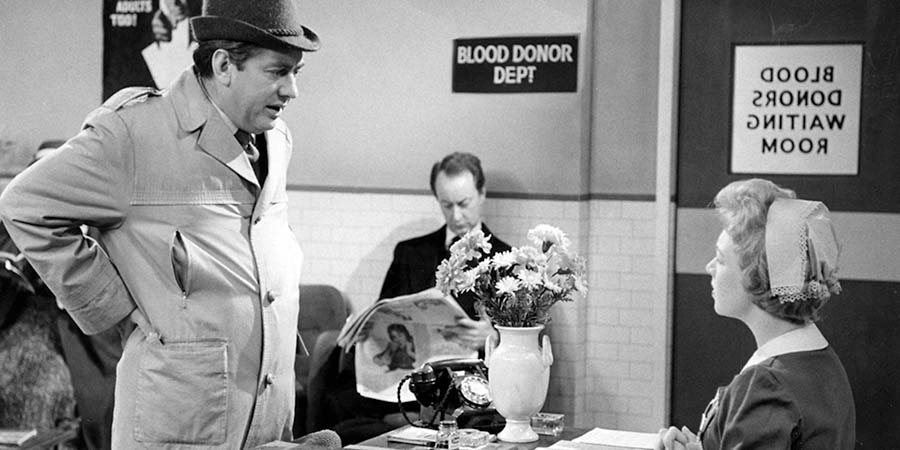
Ironically, the recording of The Blood Donor is widely considered to be the moment where it all went wrong for Tony Hancock. Although he looks to be in fairly good spirits for some of the first episodes of his next sitcom (from ATV, which followed Tony's final series on the BBC a couple of years later, and was his first without Galton & Simpson), the bad car accident he had just before the recording is said to be the moment where his unique abilities began to fade. His timing became slightly off, and he was sometimes unable to learn lines. It's hard to spot for the more casual fans, but watch The Blood Donor closely and you can see him gazing into the camera, reading the large text-on-cards that passed for autocue in those days. With this understanding of what was going on behind the scenes, it's hard to say if he really could have carried a one-man film such as The Day Off.
There's no happy ending to the proposed film. Tony squabbles with Charlotte after his lies are uncovered and he heads home. He walks into a spider's web, 'Women and spiders, a right combination', he says. When he finally makes it back to his house, rounding off his day, he steps back and looks up at the sky:
Well, I feel insignificant, I don't know about anybody else.
Nobody ever really knew the exact reason Hancock rejected the script, although the answer may have been alluded to in a magazine interview. Asked 'On TV you never show much interest in women. Do you ever long to play the great lover?', he replied:
No, because I know it would be ridiculous. Women don't fall in love with buffoons. I'd only play the lover for laughs. That's why I'd oppose any script that arranged a romance between myself and a normal young girl. The sort of girl who'd go for 'Ancock would have to be a beatnik!
And there the matter seemed to have rested. The rejection of the script brought an end to Galton & Simpson's working relationship with Tony Hancock. The ATV series, made without them, came at a time when Tony was looking increasingly vulnerable. It was never repeated after its initial thirteen episode run, archived for almost 60 years. As a result, people deduced that it probably wasn't worth seeing, but is that really the case?
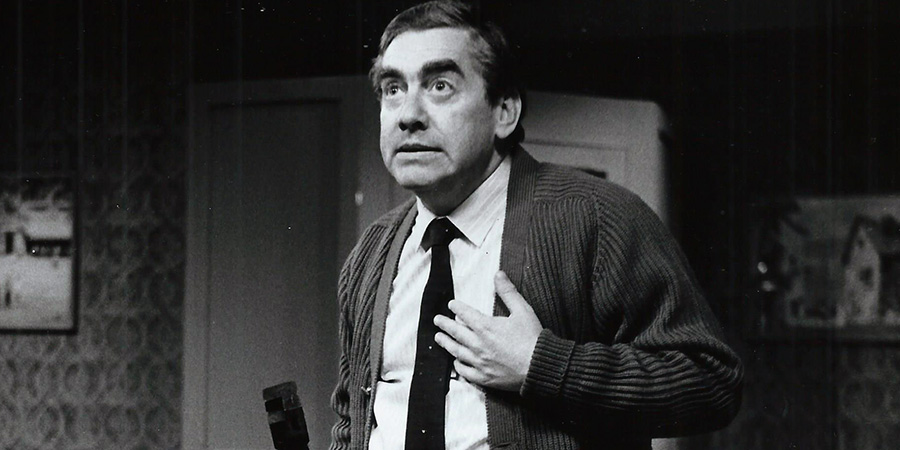
The series was scripted by a collection of writers, including several episodes by Doctor Who legend Terry Nation. One episode he scripted sees Tony looking thin and shaky clutching a glass whilst telling a man: "It all started when I had a little drink, normally I'm quite a temperate man myself...". It's fairly tragic.
Taking on the role of executive producer, Tony Hancock was supposed to be in control of this production, but you've never seen anyone look less in control of anything. In the recent Gold documentary, writer for the series Richard Harris gave an insight into how little rehearsal Tony had put into the show, recalling shouting at him whilst in a lift: "You don't understand what it's like to be given the chance to write for you, and you're fucking this up!"
There are scenes in the first few episodes where Tony really comes to life (particularly those shared with the brilliant Kenneth Griffith). His performance is as good as it ever was. But for the last half of the series Hancock almost struggles to raise his voice. Regardless of the quality of the scripts, for a lot of the time, Tony Hancock himself just didn't really seem to be there.
And so, for decades, it was thought that there was to be no charming romance for the Hancock character, and no chance of any truly ground-breaking episodes ever emerging from the series. Or so it seemed, because there does exist such an episode from the ATV Hancock series: The Girl.
As the episode begins, we meet Hancock stood at a street corner, the core premise around which the entire series is framed. Each week he hangs around on the pavement until he is swept into another bizarre escapade. This time a flower seller ambles up and sits by him.
"It's no use trying to ignore me, I've been ignored by all the crown heads in Europe", she tells him. There's immediately a nicely familiar Hattie Jacques-style dynamic between the two characters, as Hancock rebukes her for constantly trying to sell some lucky heather.
"Every man needs a wife", she says.
"Typical feminine conspiracy! You've been getting away with this sort of thing for years!" he rants, right before a nice young woman crashes into him.
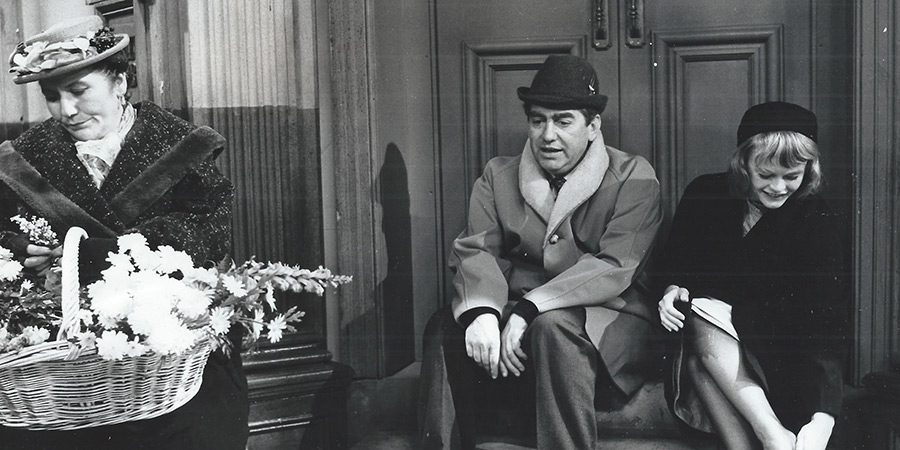
An incredibly well-cast Judith Stott needs the heel of her shoe repaired. She's the perfect woman for Tony, and although they only share a brief exchange, he's enamoured with her. Hancock's vulnerability is on full show and as he stares after her while she dashes off for her bus. It's hard not to feel in some way moved by the lingering shot.
As in The Day Off script, their relationship development is curtailed, and they don't share a whole lot of dialogue. Still, the would-be romance has a certain pull and some of the best moments in the episode aren't really the laughs. This was the start of a very particular type of sitcom episode, the one where everything is put aside for something quite sweet and genuine.
Take the Dad's Army episode Mum's Army as the real trailblazer for these kind of sitcom stories where comedy can feel secondary to pathos. Arthur Lowe needed a lot of convincing before he undertook the Brief Encounter-style plot, probably as much as Hancock did for this sweet romance. Yet, it is true for both great comic actors that they really shone in the subtle moments of despair that the respective scripts offered them. Hancock fiddles with a pack of playing cards as he talks to himself:
Well, even if I am in love with her, and I'm not saying that I am. I don't know where she is, I don't know her name, I don't know where to find her... I don't know anything about her, and that's fine... accept that I don't know how to play patience!
You get a flavour of some of the classic romance movies, The Apartment being the most obvious comparison. It might be a stretch to compare one of the all-time great movies to a Hancock ATV episode, but the similarities are there, as a nice soft jazz soundtrack almost suggests the film's main theme. That's what this episode strove for in-between scenes of Hancock style daftness. There's a 'to-do' at the hospital when Tony pretends to be a doctor, and a scene in the café where Tony finally gets chatting to the still-unnamed girl with the shoe, until a particularly odd mother and son turn up to ruin the mood.
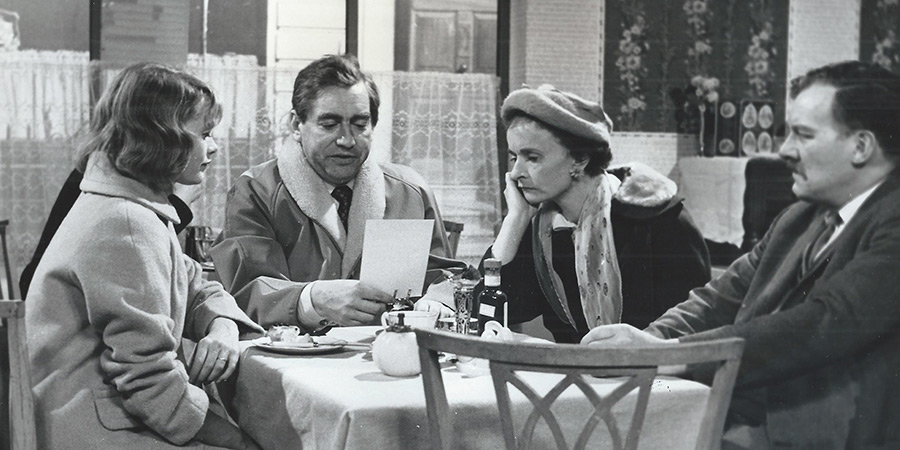
It would've been wrong for Hancock to have 'won the girl' at the end, and he doesn't here, just as it would have been in The Day Off, but things do end a little more amicably than in the proposed film. The punchline when Hancock parts ways with the still unnamed woman is really well-done, fitting, completely in character and it gets a huge laugh. It's so neatly done you would swear that Galton & Simpson had scripted it.
Godfrey Harrison did a fantastic job of capturing Hancock's unique voice in writing this episode. Tony looks up at the sign outside the hospital where the girl left him. 'Casualties' it says. Hancock stares at it glumly, 'That's me all right,' he says.
We then find him boasting to the flower seller as the episode comes full circle, "Oh yes, I found her all right, saw her last week. She works at the local hospital you know. Yeah, I'll probably be seeing her again soon... not too often of course. You know what I always say, keep them wanting", he smiles.
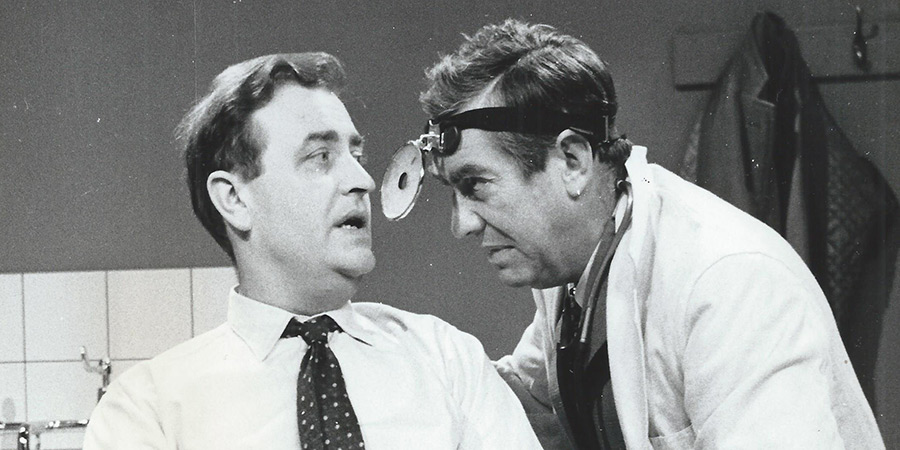
This is where the episode excels and proves itself as another example of Hancock's comedy that should be marked down as significant, alongside The Bedsitter or The Blood Donor or The Sunday Afternoon at Home. It was yet another case of Hancock, deliberately or otherwise, pioneering another sitcom-busting genre.
Tony may never have seen himself as a 'ladies' man', but The Girl gives us more than a glimpse of what it might have been like to have seen him as a Jack Lemmon-style hopeless romantic lead. How wonderful it would have been to have seen him do more - but at least we have this little gem. As for the rest of the ATV series, there are flashes of what might have been, but none more so than in The Girl. It may be the first sitcom ever to fully give way to a heartfelt but utterly hopeless love story - but it definitely was not the last.
Help us publish more great content by becoming a BCG Supporter. You'll be backing our mission to champion, celebrate and promote British comedy in all its forms: past, present and future.
We understand times are tough, but if you believe in the power of laughter we'd be honoured to have you join us. Advertising doesn't cover our costs, so every single donation matters and is put to good use. Thank you.
Love comedy? Find out moreThe Rebel

For the audiences of 1961, accustomed to seeing Tony Hancock as a flickering 405-line black and white image, The Rebel must have come as a revelation: there was The Lad Himself, larger than life, on the big screen, in colour. Stone me, who'd have thought it!
Now, in a revelation to modern viewers, The Rebel has been painstakingly restored from the original camera negative, and it looks better than ever; so pristine and clear that it could almost have been released last week. Just don't start looking for errors in the period detail: it really was made in 1960...
As the 1950s came to a close, the career of Tony Hancock was nearing its zenith. With half a decade of successful radio and TV series to his credit it was time to make the move into films, a step that would see Hancock aiming high, with ambitions to make it as an international star. The grandiose ambition of 'The Lad' might well have come straight from the pen of scriptwriters Ray Galton and Alan Simpson, and is certainly reflected in their script for The Rebel. The Hancock persona as seen on screen would have been very familiar to radio and TV audiences: grandiose, but thwarted ambition, followed by the pompous playing-up to his new found fame - and he was afforded plenty of opportunities to deliver the kind of comic routines, facial reactions and vocal nuances that had made him a star.
This rare chance to see Hancock in colour, and against some vivid Parisian backdrops - many shot on location - looks as sumptuous today as it must have done to the cinema audiences of 1960, even moreso in this stunning new restoration. The colour photography is especially suited to scenes such as those at the party of a modern art collector (Dennis Price), whose multi-hued residence would not have looked out of place in an episode of Batman.
Hancock himself is at the top of his comedic game, fresh from his successful run on BBCtv and radio - yet the film is tinged with poignancy at the thought of what might have been, and the tragedy that lay just a few years in the future. When Nanette Newman's blue-lipglossed existentialist asks of Hancock: "why kill time when you can kill yourself?", it's almost an edge-of-the-seat moment as we wait to see his reaction. He considers the remark, before breezily replying: "Yes, it's a point of view. I suppose so."
First released: Monday 30th September 2019
- Distributor: Network
- Region: B
- Discs: 1
- Minutes: 105
- Subtitles: English
- Catalogue: 7958119
![]() Buy and sell old and new items
Buy and sell old and new items
Search for this product on eBay
BCG may earn commission on sales generated through the links above.
- Released: Monday 20th September 2021
- Distributor: Network
- Region: B
- Discs: 1
- Minutes: 106
![]() Buy and sell old and new items
Buy and sell old and new items
Search for this product on eBay
BCG may earn commission on sales generated through the links above.
- Released: Monday 27th March 2023
- Distributor: Network
- Region: B
- Discs: 1
- Minutes: 101
![]() Buy and sell old and new items
Buy and sell old and new items
Search for this product on eBay
BCG may earn commission on sales generated through the links above.
- Distributor: Network
- Region: 2
- Discs: 1
- Minutes: 101
- Subtitles: English
- Catalogue: 7954741
![]() Buy and sell old and new items
Buy and sell old and new items
Search for this product on eBay
BCG may earn commission on sales generated through the links above.
Hancock - The Complete ATV Series
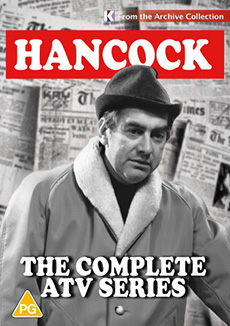
Following the conclusion of Hancock's Half Hour on BBC radio and television, Tony Hancock began a new series in 1963 with ITV broadcaster ATV.
Airing for just one series of 13 episodes, the series - simply titled Hancock - saw the star in a new series of sitcom mishaps.
Now, complete and uncut, it is available on DVD for the very first time.
First released: Thursday 18th August 2022
- Distributor: Kaleidoscope
- Discs: 3
- Minutes: 323
- Catalogue: KPU1963
![]() Buy and sell old and new items
Buy and sell old and new items
Search for this product on eBay
BCG may earn commission on sales generated through the links above.

